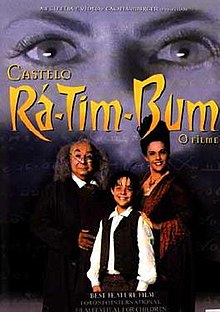Castelo Rá-Tim-Bum (film)
| Castelo Rá-Tim-Bum | |
|---|---|
 Film poster | |
| Directed by | Cao Hamburger |
| Written by | Cao Hamburger José Rubens Chachá José Carvalho de Azevedo João Emanuel Carneiro Fernando Bonassi Victor Navas Anna Muylaert |
| Produced by | Van Fresnot Alain Fresnot Cao Hamburger |
| Starring | Diego Kozievitch Rosi Campos Sérgio Mamberti Marieta Severo |
| Edited by | Michael Ruman |
| Music by | André Abujamra Lulu Camargo |
Production companies | |
| Distributed by | Columbia TriStar Film Distributors International |
Release date |
|
Running time | 108 minutes |
| Country | Brazil |
| Language | Portuguese |
| Budget | R$6,7–7 million[2][3] |
| Box office | R$3,031,875[4] |
Castelo Rá-Tim-Bum is a 1999 Brazilian film directed by Cao Hamburger, based on the Castelo Rá-Tim-Bum TV series.[5]
Plot
In Castelo Rá-Tim-Bum 300-year-old Nino looks like he is eight or nine years old. Described by Graeber as a "Brazilian counterpart" to Harry Potter, Nino tries to write a book of spells. His aunt and uncle criticize his apprenticeship and Nino wants to play with ordinary children. Losangela, a relative, begins conspiring with real estate developers who hope to tear down Nino's family's mansion.[6]
Cast
- Diegho Kozievitch as Antônino "Nino" Stradivarius
- Rosi Campos as Morgana Stradivarius
- Sérgio Mamberti as Dr. Victor Stradivarius
- Marieta Severo as Losângela Stradivarius
- Pascoal da Conceição as Abobrinha
- Matheus Nachtergaele as Rato
- Ângela Dip as Pénelope
- Leandro Léo as João
- Mayara Constantino as Cacau
- Oscar Neto as Ronaldo
Reception
Castelo Rá-Tim-Bum grossed R$3,031,875 and was watched by 725,329 people in the 134 Brazilian theaters in which it was released.[4] It was nominated for the 2nd Grande Prêmio Cinema Brasil for Best Film, Best Screenplay, and Best Release, and Vera Hamburger and Clóvis Bueno won the Best Art Direction Award.[7][8] At the 2000 Chicago International Children's Film Festival it won the "Children's Jury Prize – International Feature Film or Video - Live Action".[9] Critical-wise, Laurel Graeber of The New York Times said that it "charmingly captures the life of a Latin-style Addams Family."[6]
References
- ^ "Castelo Rá-tim-bum". AdoroCinema (in Portuguese). AlloCiné. Retrieved June 2, 2014.
- ^ Eduardo, Cléber (December 1, 2010). "Custos em alta". Época (in Portuguese). Editora Globo. Retrieved June 2, 2014.
- ^ "Hoje tem Castelo Ra-Ti-bum Sesc Arsenal". Gazeta Digital (in Portuguese). Grupo Gazeta. December 14, 2008. Archived from the original on June 5, 2014. Retrieved June 2, 2014.
- ^ a b "Filmes Brasileiros Lançados - 1995 a 2012" (PDF) (in Portuguese). Ancine. p. 31. Archived from the original (PDF) on March 27, 2014. Retrieved June 2, 2014.
- ^ "Ra Tim Bum Castle (2000)." The New York Times. Retrieved on December 8, 2008.
- ^ a b Graeber, Laurel. "A Magical Childhood." The New York Times. Retrieved on December 8, 2008.
- ^ "Veja os indicados do 2º Grande Prêmio Cinema Brasil". Cineclick (in Portuguese). R7. February 5, 2001. Archived from the original on February 28, 2014. Retrieved February 28, 2014.
- ^ ""Eu Tu Eles" vence "Oscar Brasileiro"". O Estado de S. Paulo (in Portuguese). Grupo Estado. February 11, 2001. Archived from the original on July 9, 2013. Retrieved February 28, 2014.
- ^ "17th Annual Chicago International Children's Film Festival 2000 Awards" (PDF). Chicago International Children's Film Festival. Archived from the original (PDF) on May 4, 2012. Retrieved June 2, 2014.
